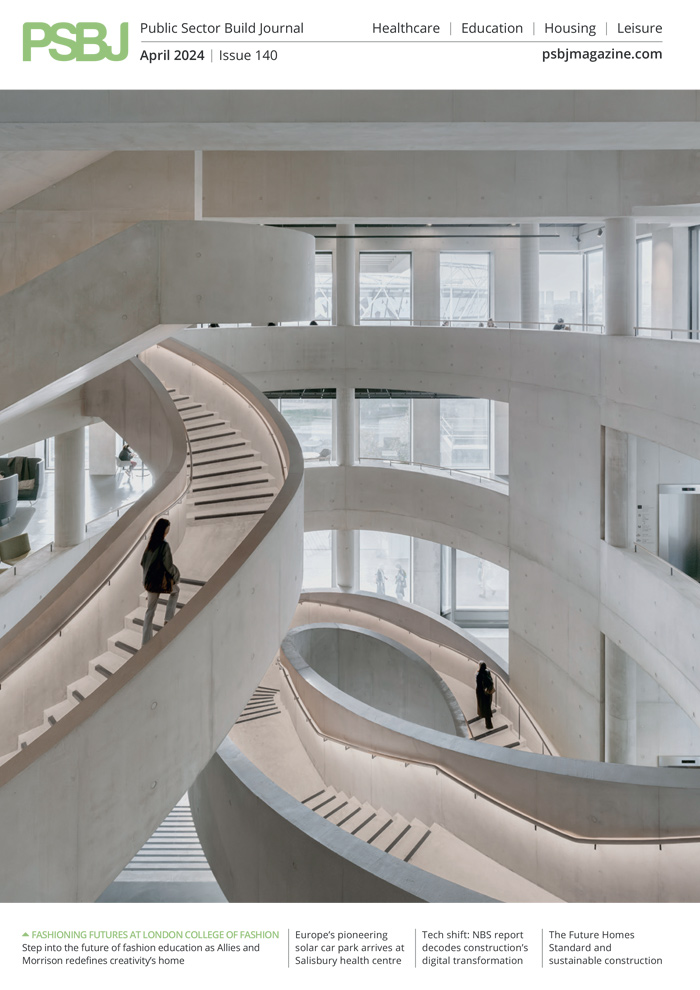Tim Oakley, Head Consultant at LHC, talks to PSBJ about its work to instill confidence in local authorities to implement MMC and demonstrates the accessibility of offsite through its frameworks and tools.
LHC
The first CoVID-19 lockdown marked a sudden and radical change for public-sector housing and construction procurement. Fast forward to lockdown number three and it appears that the changes of the last year could be beneficial for new MMC contracts in the public sector.
Kickstarting change
The closure of offices and sites initially left local authority and housing association schedules in tatters, with public bodies unable to plan the completion of existing projects or to launch new projects. The preparedness of procurement staff, both on the supplier and buyer side, to carry out their respective duties was placed under significant stress.
As the crisis has continued, it became obvious to us that contracting authorities and their suppliers would need to work in partnership to plan an eventual exit from relief and transition to new, sustainable operating models. This is what has been happening over the last year. LHC is taking a very positive view, as much of the disruption of 2020 has accelerated a process of change that will bring many benefits for this year.
Challenging perceptions of MMC
This environment of change has also helped many local authorities and public-sector clients to revisit their thinking on construction. While they may have been reluctant to be ‘early adopters’, they can now see that this is a good time to learn from others’ experiences of MMC. By applying that learning to the way public-sector projects are delivered and embracing the benefits that MMC can offer, they can help to address a range of delivery challenges that local authorities were facing before the pandemic, particularly the shortage of local authority housing.
The main request from LHC’s clients is for open and honest insights from our many years’ experience delivering hundreds of MMC projects large and small. The key benefits are already clear to us: MMC homes have lower overall lifecycle costs as project delivery is much faster, so contracting authorities will see the sales or rent revenue much earlier. But there can be pitfalls too, so working with expert local procurement teams is the best way to get started.
Support for contracting authorities
There are often concerns that MMC housing schemes are too complex to manage. However, our experience is, that through framework agreements, contracting authorities can manage this process much more easily; with a single point of contact and technical expertise from the initial stages through to design, construction, handover and use. LHC’s Offsite Project Integrator (OPI1) framework can help to deliver an experienced and integrated supply chain.
The OPI1 framework was launched last year to help authorities to find the technical support that can help with the planning and implementation of offsite housing schemes. It covers the preliminary stages prior to RIBA Stage 0 and then implementation to Stage 7. This framework sits alongside the Offsite Construction of New Homes (NH2) framework to offer local authorities and housing associations solutions at every stage, from design right through to occupation.
Reducing risk
LHC has also introduced the Framework Alliance Contract (FAC-1) in all its procurement frameworks, with the aim of sharing objectives, introducing transparent performance measurement, aligning commercial interests and setting up collaborative governance, all of which promotes shared risk management. FAC-1 provides a new style of framework agreement which achieves much higher satisfaction rates between all parties. Disputes are reduced, and alliance members can more easily work together to achieve the greater efficiency, value outputs and cost savings from MMC projects.
Delivering outcome-based procurement
New public contracts regulations in 2015 forced procurement teams to consider key issues such as sustainability, whole-life costs, lifecycle analysis and social value. All of these issues have been driven home even harder over the last year.
Of course, there is still lots to be done to ensure the new, post-COVID ‘outcome-based’ procurement approach, as set out in the Transforming Public Procurement green paper published last December, is better understood and more widely adopted.
The green paper suggests that buyers should be allowed to include criteria that go beyond the contract to encourage suppliers to operate in a way that contributes to economic, social and environmental outcomes on the basis of the most advantageous tender. It also proposes using public procurement reform to drive innovation in the UK, through fostering markets for innovative new products and services.
Using a new flexible, competitive procedure, buyers will be able to engage proactively with the market much earlier than before. This early engagement is vital if the UK is to take advantage of the innovative solutions that MMC can offer to drive the delivery of new homes. It will also allow the MMC market to bring its wealth of technological experience to the table to provide more imaginative proposals.
A further exciting proposal will support innovation in construction by encouraging market collaboration. Consideration is being given to the use of ‘innovation labs’ that aim to bring innovative suppliers and relevant bodies together to develop ideas, including through ‘multiple supplier collaborative solutions’. This also links to recent guidance in the Construction Playbook Procurement Policy Note 09/20, that highlights the need for in-scope organisations to drive the adoption of MMC including digital and offsite manufacturing technologies through standardisation and aggregation.
This is something LHC is keen on doing through its new OffSite Alliance working groups, where the consultants, contractors and manufacturers appointed to our offsite frameworks will collaborate with our clients to provide strategic direction and leadership. This insight will be used to improve the development of the use of offsite construction through LHC members and across the wider market.
This will continue to be our focus for 2021, along with increased emphasis on pan-industry collaboration – the only way to ensure we truly build back better.









